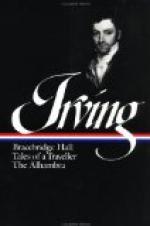This Green Arbour court I found to be a small square of tall and Miserable houses, the very intestines of which seemed turned inside out, to judge from the old garments and frippery that fluttered from every window. It appeared to be a region of washerwomen, and lines were stretched about the little square, on which clothes were dangling to dry. Just as we entered the square, a scuffle took place between two viragos about a disputed right to a washtub, and immediately the whole community was in a hubbub. Heads in mob caps popped out of every window, and such a clamor of tongues ensued that I was fain to stop my ears. Every Amazon took part with one or other of the disputants, and brandished her arms dripping with soapsuds, and fired away from her window as from the embrazure of a fortress; while the swarms of children nestled and cradled in every procreant chamber of this hive, waking with the noise, set up their shrill pipes to swell the general concert.
Poor Goldsmith! what a time must he have had of it, with his quiet Disposition and nervous habits, penned up in this den of noise and vulgarity. How strange that while every sight and sound was sufficient to embitter the heart and fill it with misanthropy, his pen should be dropping the honey of Hybla. Yet it is more than probable that he drew many of his inimitable pictures of low life from the scenes which surrounded him in this abode. The circumstance of Mrs. Tibbs being obliged to wash her husband’s two shirts in a neighbor’s house, who refused to lend her washtub, may have been no sport of fancy, but a fact passing under his own eye. His landlady may have sat for the picture, and Beau Tibbs’ scanty wardrobe have been a facsimile of his own.
It was with some difficulty that we found our way to Dribble’s lodgings. They were up two pair of stairs, in a room that looked upon the court, and when we entered he was seated on the edge of his bed, writing at a broken table. He received us, however, with a free, open, poor devil air, that was irresistible. It is true he did at first appear slightly confused; buttoned up his waistcoat a little higher and tucked in a stray frill of linen. But he recollected himself in an instant; gave a half swagger, half leer, as he stepped forth to receive us; drew a three-legged stool for Mr. Buckthorne; pointed me to a lumbering old damask chair that looked like a dethroned monarch in exile, and bade us welcome to his garret.
We soon got engaged in conversation. Buckthorne and he had much to say about early school scenes; and as nothing opens a man’s heart more than recollections of the kind, we soon drew from him a brief outline of his literary career.
THE POOR DEVIL AUTHOR.
I began life unluckily by being the wag and bright fellow at school; and I had the farther misfortune of becoming the great genius of my native village. My father was a country attorney, and intended that I should succeed him in business; but I had too much genius to study, and he was too fond of my genius to force it into the traces. So I fell into bad company and took to bad habits. Do not mistake me. I mean that I fell into the company of village literati and village blues, and took to writing village poetry.




